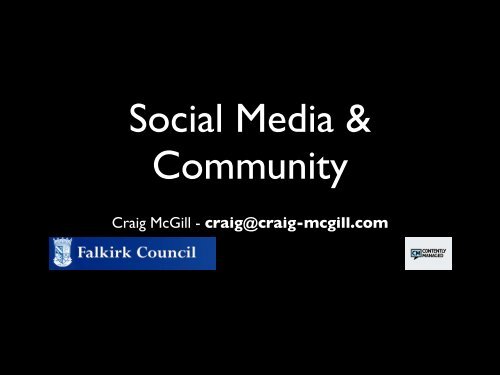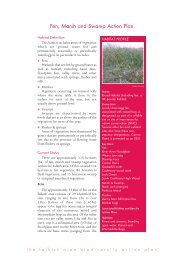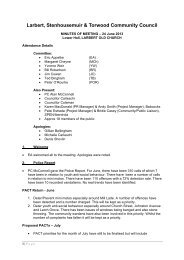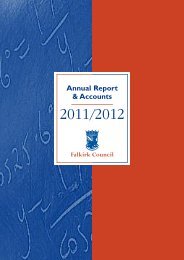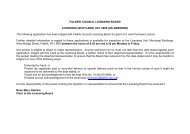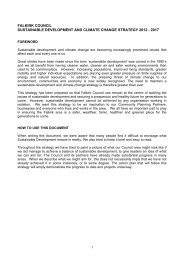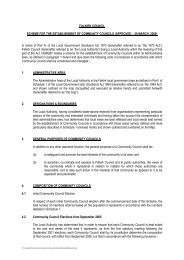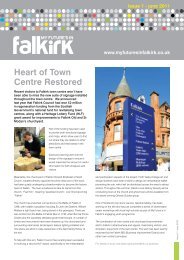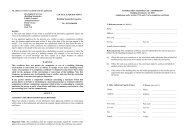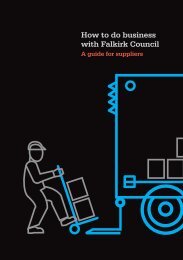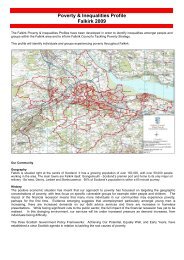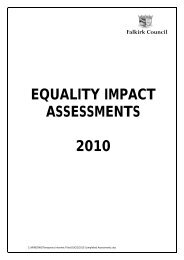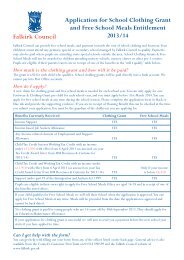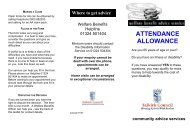Craig McGill - craig@craig-mcgill.com - Falkirk Council
Craig McGill - craig@craig-mcgill.com - Falkirk Council
Craig McGill - craig@craig-mcgill.com - Falkirk Council
You also want an ePaper? Increase the reach of your titles
YUMPU automatically turns print PDFs into web optimized ePapers that Google loves.
Social Media &<br />
Community<br />
<strong>Craig</strong> <strong>McGill</strong> - <strong>craig@craig</strong>-<strong>mcgill</strong>.<strong>com</strong>
What is social media?<br />
Twitter usage across Europe (the brighter<br />
the light, the more activity)
Connectivity<br />
Global Facebook activity showing connections
Online but not alone
Multiple outlets
Most popular<br />
• Bebo, MySpace, Friends Reunited in past<br />
• YouTube, Pinterest, Facebook, LinkedIn,<br />
Twitter, blogging, forums, Google+<br />
• Also Flickr, Quora and many others...<br />
• What to choose? Where to go?
“Just a pile of saddo’s...”<br />
• Like it lump it, digital engagement here to<br />
stay - if you don’t reach out, you miss out<br />
on getting more people involved<br />
• It’s not about replacing physical activity but<br />
<strong>com</strong>plementing it<br />
• Not everyone can get to meetings - does<br />
that mean they should be excluded?
“Just a pile of saddo’s...”<br />
•<br />
•<br />
•<br />
Only 10% of a group are ever strongly active<br />
(attending meetings, being but in positions of<br />
authority, etc)<br />
Does that mean the other 90% should be<br />
excluded?<br />
Digital gives them a chance to be involved -<br />
they can read up on information, pass on<br />
opinions, be helpful
Convince & convert<br />
• Everyone has an opinion on their local <strong>com</strong>munity<br />
• Not everyone may share your passion so talk and<br />
convince about why being involved is important -<br />
show them why they should get involved<br />
• Even if people can’t make meetings, what they<br />
think is still valid, don’t dismiss it - if anything<br />
digital allows you to see more opinions than<br />
before
Convince & convert<br />
•<br />
Target people likely to be invested in<br />
<strong>com</strong>munity - and get them to tell people that<br />
you’re on Facebook/Twitter/blogs/YouTube<br />
•<br />
•<br />
•<br />
•<br />
local businesses<br />
mums and parent groups<br />
councillors & council groups<br />
MPs, MSPs
This a <strong>com</strong>munity
But so’s this...
Community<br />
A modern <strong>com</strong>munity can be physical or<br />
digital - what matters is what brings them<br />
together - anywhere<br />
A person’s opinion online is as valid as<br />
their opinion in the pub or elsewhere
So, social media then...
So, social media then...
Why do people do it?<br />
• Hectic lifestyles means less time for<br />
catching up<br />
• Easy to do<br />
• Can be done anywhere<br />
• Passes the time<br />
• People like to share information
•<br />
•<br />
•<br />
•<br />
•<br />
<strong>Council</strong>s? Businesses?<br />
Face to Face costs £10, phone £2<br />
Online: 40pence<br />
People shop 24 hours a day<br />
People want information 24 hours a day<br />
Not everyone can be glued to radio for updates -<br />
need information from somewhere<br />
Source: Socitm - socitm.gov.uk
People look online...
Too much!
Most popular<br />
• Facebook - 850million active and growing<br />
• Twitter - 200million active and growing<br />
• YouTube - one hour of video per second<br />
• Blogs - a way of beating traditional media
Scotland<br />
• Facebook - 1 in 3 people are on it<br />
• Twitter - 49,500 accounts<br />
• Blogs - hundreds of blogs as seen via http://<br />
scottishroundup.co.uk/
Before you start...
Ask yourself...<br />
• WHY are you going online?<br />
• WHAT is your <strong>com</strong>munity name (so people<br />
can find you)?<br />
• WHAT are you going to say?<br />
• HOW will you respond to people?<br />
• Can you COMMIT to the time needed?
1, 2, 3...100,000<br />
Don’t expect as many fans or Likes as<br />
these people - you are engaging locally<br />
and that’s a smaller audience
Step 1: what’s the chat?
Seeing what people say<br />
• Set up Google Alerts to see what people<br />
are saying about the <strong>com</strong>munity, you, the<br />
councillor - anything<br />
• Free service via www.google.<strong>com</strong>/alerts
Google Alerts
Step 2: plan your chat
Step 3: Getting involved
Handy links<br />
• Facebook.<strong>com</strong><br />
• Facebook.<strong>com</strong>/pages/create.php<br />
• Facebook.<strong>com</strong>/username/
Facebook pages/<br />
accounts<br />
• Facebook accounts are personal - where<br />
you share/see what you & friends/family<br />
have been up to<br />
• Facebook pages are for a business or a<br />
matter of interest - a charity, a local issue, a<br />
<strong>com</strong>munity council
Facebook account
Facebook page
Handy links<br />
• Facebook.<strong>com</strong><br />
• Facebook.<strong>com</strong>/pages/create.php<br />
• Facebook.<strong>com</strong>/username/
The difference<br />
• Facebook page is PERSONAL<br />
• Facebook page is for a cause/issue - telling<br />
people about the <strong>com</strong>munity, selling whisky,<br />
talking about <strong>Falkirk</strong>, - it’s not about one<br />
person
The steps<br />
• Set up a personal account at Facebook.<strong>com</strong><br />
• Create a page at Facebook.<strong>com</strong>/pages/<br />
create.php<br />
• Give your page a name at Facebook.<strong>com</strong>/<br />
username/<br />
• Tell everyone else what the page name is
Tips<br />
• You need a Facebook account to set up a<br />
Facebook page<br />
• Give Facebook page an easy to remember<br />
name - Facebook.<strong>com</strong>/denny or<br />
Facebook.<strong>com</strong>/denny<strong>com</strong>munity for<br />
example
Fill in as much detail as<br />
possible about your<br />
Facebook page - give<br />
people all they<br />
information they might<br />
need<br />
Essential
What’s good on<br />
• Everything<br />
• Words<br />
• Pictures<br />
• Videos<br />
Facebook?
Plan, plan, plan
What could go up?<br />
• Ideas for updates<br />
• Local football/sport team results<br />
• Any news about local shops or local people<br />
• Details of what local councillor is up to<br />
• Roadwork or other information<br />
• Details of events at a park<br />
• Police details<br />
• Anything of interest in the Herald?<br />
• Meeting times/items for discussion<br />
If it’s good enough<br />
to talk about<br />
when you see<br />
someone or in<br />
the pub or at a<br />
meeting, it’s good<br />
enough for online
Good tips<br />
• Reply to everyone who posts to you<br />
• Go and talk/look at the pages of people you<br />
follow - talk to them on their pages<br />
• Set expectations<br />
• Vary the content, mention lots of people<br />
• Try not to post too much on your own page<br />
in one day - schedule things out
More tips<br />
• You can post links to material you’ve seen<br />
elsewhere (but don’t post it directly if you<br />
don’t own copyright) so instead of posting a<br />
picture, post the www. link to it<br />
• In the UK, the best time to post is between<br />
8-9.30pm<br />
• If you use tools like Hootsuite (more later)<br />
you can schedule your Facebook posts
Last of the tips<br />
• If you set a page up, you can have more than<br />
one person as the administrator, meaning<br />
there’s more of you to share the work<br />
between<br />
• Setting up a Facebook page is free (and so is a<br />
Twitter page, YouTube page and so on) - don’t<br />
pay unless it’s for something extra.
Remember it’s social<br />
• Add in @ and then a person’s name<br />
• Invite people to group’s by email<br />
• Add details to all materials<br />
• Share your other online activity<br />
• Say who you are
Spam on a page -<br />
removing it<br />
Go to the arrow/globe at side of post, click,<br />
follow instructions
Keep an eye on...
Insights<br />
Insights lets you see<br />
who is looking at<br />
your posts, how<br />
popular they are -<br />
great way to see if<br />
you are reaching the<br />
right people & what<br />
is popular on page
Twitter<br />
• TWEET<br />
– Each <strong>com</strong>ment posted on Twitter is referred to as a tweet, and the act<br />
of sending a tweet is referred to as tweeting<br />
• RETWEET<br />
– A Retweet is a type of message posted (or tweeted) on micro<br />
blogging service, Twitter, that repeats some information previously<br />
tweeted by another user, symbolised by RT at beginning of Tweet. E.g.<br />
RT@BRITNEYSPEARS Social Media Academy is hot!<br />
• FOLLOWING<br />
– To subscribe to someone’s Twitter updates<br />
• FOLLOWERS<br />
– To have people subscribing to your Twitter updates<br />
• @Reply<br />
– Beginning your Tweet or citing @personsname in your Tweet designates<br />
that you are referring to @personsname. People tend to monitor their<br />
@ mentions so it acts as a convenient, albeit public, way to<br />
<strong>com</strong>municate with people who are not following you
Twitter basics<br />
• HASHTAG<br />
– a topic with a hash symbol (“#”) at the start to identify it. Twitter hashtags like<br />
#followfriday help spread information on Twitter while also helping to organise<br />
it<br />
• LIST<br />
– Basically Twitter’s “Group” function, offers a convenient way to bunch other<br />
users on Twitter into Groups to get an overview of what they’re up to<br />
• DM<br />
– Short for Direct Message, a private Tweet which you can only send to people<br />
who are following you<br />
• TRENDING TOPICS<br />
– Twitter indexes the most <strong>com</strong>mon phrases currently appearing in messages,<br />
making it into a discovery engine for finding out what is happening right now.<br />
Cool
Anyone here using it?<br />
• Multiple sites to let you find local people - all<br />
you have to do is type in the world <strong>Falkirk</strong><br />
• Twitaholic.<strong>com</strong><br />
• Wefollow.<strong>com</strong><br />
• Twellow.<strong>com</strong> & Twellowhood.<strong>com</strong>
Twellow
Wefollow
Wefollow
A Twitter tip<br />
• If you find an account you can click on their<br />
FOLLOWERS and follow them back<br />
• Odds are anyone following <strong>Falkirk</strong> <strong>Council</strong><br />
or <strong>Falkirk</strong> FC is a local person, so follow<br />
them to build up your followers<br />
• You can do this on old Twitter accounts too
Hootsuite.<strong>com</strong>
Hootsuite.<strong>com</strong><br />
• Another way of using Twitter - presents the<br />
same information in a slightly more <strong>com</strong>pact<br />
way<br />
• You still need a Twitter account to use it.<br />
Then set up Hootsuite and set it up as you<br />
like - set up columns for mentions of <strong>Falkirk</strong><br />
for example
Finding more people<br />
• The entry point to trying to find people<br />
within Twitter is probably Twitter Search<br />
• Twitter Search can be used to find<br />
information within Twitter in real time<br />
• A decent place to start if you know who<br />
you’re looking for – not so great if you<br />
don’t, as is often the case
Finding...<br />
• You can also click the Advanced search link to do more advanced searches<br />
– With all of the words you specified, none of the words you specified, or exact<br />
phrases<br />
– In specific languages<br />
– From specific people<br />
– Near specific places<br />
– On or between specific dates<br />
– Containing emoticons<br />
– Containing links<br />
– Containing ReTweets
Advanced search
What the #####<br />
• People often use hashtags to find information about specific subjects, so<br />
if you use hashtags, they are more likely to find you via that subject.<br />
Hashtags are therefore a great way to extend your reach and get more<br />
followers in a meaningful way.<br />
• There are a wide variety of already established hashtags, and new ones<br />
being created daily, that you can join<br />
• You need to be careful, however, that your use of hashtags is consistent<br />
with both your brand and the tag itself<br />
• You can create any hashtag you want but remember you’ll never own it
#hurricanewhat?<br />
• While you certainly shouldn’t use hashtags to describe all of your tweets, they can be<br />
helpful<br />
• The first step in creating a hashtag is deciding on the tag word itself<br />
• You should pick something memorable, easy to spell, and perhaps more importantly, as<br />
short as possible<br />
• Once you’ve figured out the tag itself, the next step is simple: start using it and<br />
promoting it<br />
• Make sure your tweets using the hashtag are worthwhile and add something of value to<br />
the conversation
Making a hash of it<br />
• Unfortunately, as hashtags have be<strong>com</strong>e more<br />
popular, they’ve also be<strong>com</strong>e a vehicle for spam<br />
• You should never use a hashtag on a tweet<br />
unrelated to that tag, and you should never stuff<br />
your tweets with currently popular hashtags<br />
with the sole purpose of appearing in Twitter<br />
search results<br />
• Proper etiquette dictates that you should only<br />
use hashtags if your tweet is actually relevant to<br />
the tag’s associated meme or topic.
What the...<br />
Easy way to find out what a # means
See how far your<br />
tweets go...
Tweetreach<br />
Measures how far a tweet went...
Keep it short
Takes www.whyteandmackay.<strong>com</strong> and shrinks it<br />
to bit.ly/po2ime - saves space for tweeting
Video
• YouTube is the second largest search<br />
engine<br />
• That should speak volumes in terms of<br />
the significance and importance of<br />
having a presence on YouTube<br />
• The other important factor is that<br />
YouTube is a social networking site on<br />
par with Facebook<br />
• You can make friends on YouTube<br />
(subscribe to channels) and others can<br />
make friends with you (subscribe to<br />
your channel)<br />
YouTube
Why?<br />
• YouTube allows you to tag your videos, share them easily on other sites<br />
(Twitter, Facebook, etc.), and it’s as socially integrated as a site gets<br />
• There are two very solid arguments to focus your strategic efforts ONLY<br />
on YouTube (basically ignoring other platforms like Viddler or Vimeo)<br />
• YouTube is the largest and arguably best integrated with Google and<br />
other colossal Internet hubs (in fact, YouTube is an Internet hub of its<br />
own)<br />
• If mastering multiple platforms seems like an overwhelming task, you<br />
would be well-advised to focus your efforts on YouTube alone
Get a channel<br />
• A YouTube Channel is like a Facebook page - a place where you can<br />
post material relevant to one (or many topics) so you would have your<br />
own personal YouTube page but one for the <strong>com</strong>munity council too.<br />
• And you can customize your YouTube channel by giving it a branded skin<br />
• You can also connect your YouTube account to your Facebook and<br />
Twitter accounts<br />
• On your YouTube page, go to the top and:<br />
– Click on Username<br />
– Click on Account<br />
– Click on Activity Sharing over on the left<br />
– Select your different accounts to connect<br />
• It is re<strong>com</strong>mended just to select “Like” and/or “Favourite” in the<br />
settings where you choose to automatically send updates onto the<br />
profiles you select here
Video<br />
• Engagement - video offers<br />
tremendous opportunity to engage<br />
audience groups online<br />
• Media thirst – traditional media<br />
sites are constantly trying to<br />
<strong>com</strong>pete with the BBC’s extensive<br />
libraries of content<br />
• PR opportunity – creates<br />
opportunity for high-profile story<br />
placement<br />
• Creative extension –<br />
opportunity to add further depth to<br />
a story
Video tips<br />
• Sound matters as much as the picture<br />
• Try and have a steady camera/cameraphone<br />
• Use YouTube or Vimeo instead of your own<br />
website<br />
• Once posted, provide a text version if you can<br />
• If in doubt, ask permission to film people - but<br />
sometimes even if they say no, you can be<br />
justified in putting it online<br />
• Tell people on Facebook and Twitter that you’ve<br />
posted a video and share the link
Remember podcasts<br />
• Audio and video podcasts still incredibly popular<br />
• Platforms like AudioBoo have shown life in the format<br />
• Easy to record via Skype and most PCs/macs have simple editing tools<br />
• If recording, use headsets, in a quiet room free from other noise and<br />
distractions<br />
• Sit up straight and have water handy<br />
• Avoid the umms and the ahhs. Instead buy time by saying “That’s a good<br />
question” or “You may see it that way, but...”<br />
• Companies like Libsyn offer affordable hosting costs<br />
• iTunes still popular to be hosting podcasts
AudioBoo
What can I video/record?<br />
• Everything<br />
• Events<br />
• Meetings<br />
• Previews of events<br />
• After events
Blogging
Blogs for everything
Blogs for everything
Blogs for everything<br />
Schools have<br />
blogs!<br />
Children<br />
learning to<br />
share and<br />
engage -<br />
fantastic
Blogs for everything<br />
More4Mums<br />
- a <strong>Falkirk</strong><br />
blog that<br />
became a<br />
business<br />
selling<br />
maternity<br />
clothes
The Basics<br />
• The most important aspect of your blog is the<br />
content. As long as you write regularly, frequently<br />
and engagingly, you are blogging. Content is king, and<br />
it’s the main reason people will subscribe to you.<br />
• But think about:<br />
–Blog avatar<br />
–Tag cloud<br />
–Blogroll<br />
–Contact page
Avatar/picture<br />
• An avatar is a small picture that you use to identify yourself<br />
• Try to choose an image that will work across all of your online presences. So, for<br />
example, it will work at 48x48 pixels for your Twitter account, and at larger sizes<br />
for your Facebook page, and so on. In this way you create a coherent, consistent,<br />
recognisable online brand.<br />
• If you are a personal blogger, it’s <strong>com</strong>mon to show a photograph of yourself.<br />
Some people like to stylise their photos by making them black and white, or only<br />
showing part of their faces.<br />
• If you are a corporate blogger, it’s <strong>com</strong>mon to use your organisation’s logo
• A ‘tag’ is a keyword that you use to<br />
categorise what you write about.<br />
• So, for example, if you write about<br />
Microsoft, you might tag your post<br />
‘technology’ even though you don’t<br />
actually mention that word in the<br />
post, because that’s what the post<br />
is about.<br />
• This makes it easier for people to<br />
find your post because you<br />
categorised it, rather than a<br />
<strong>com</strong>puter.<br />
Tag
About<br />
• As with the tag cloud, you need to tell people<br />
who you are very quickly so that they can<br />
decide to subscribe<br />
• An About page is also your opportunity to get<br />
search engine attention, by placing keywords<br />
in your page. You will learn about keywords<br />
later.<br />
• You should include the following information<br />
in your About page:<br />
– Your (real) name<br />
– The services you offer<br />
– The organisation you represent, if any<br />
– Your biography.
Blogroll<br />
• A list of bloggers whom you read or think are good, is called a blogroll<br />
• By including a blogroll you do several things in one go:<br />
– You promote the blogger that you link to, because you create a link going to<br />
that blogger. Search engines like these links, so the blogger will rise in search<br />
engine rankings.<br />
– In return, the blogger might link to you. Even if that blogger does not, you<br />
have established a link which will help you in search engines, although to a<br />
lesser extent.<br />
– You help people who <strong>com</strong>e to your blog to find other similar bloggers, and<br />
they will be more likely to subscribe to you because you are perceived as a<br />
productive, helpful member of that <strong>com</strong>munity
Find blogs via search...
Contact<br />
• A contact page is important because people may want to contact you personally.<br />
If you’re running a corporate blog, this could mean the difference between<br />
making or losing a sale.
Quick tip<br />
• You don’t need to pass on your own contact details -<br />
you can have it as a postal address or phone number<br />
for the council or the local councillor (if they have<br />
public details)<br />
• If providing an email address, don’t put it up as text -<br />
you will be spammed - put it up as a picture or get<br />
someone to create a contact form
Plan what to put on blog
What can I blog?<br />
• Everything<br />
• Doesn’t even need to be current - can be<br />
about the <strong>com</strong>munity in the past and have<br />
people post pictures, memories, etc
Where to blog<br />
• You can buy your own website and set it up for as little as £15<br />
or you can let someone else do all the hosting (and cost) for<br />
you<br />
• If someone else hosts it for you, it’s free but you may have a<br />
longer website address -<br />
www.denny<strong>com</strong>munitycouncil.wordpress.<strong>com</strong> - for example<br />
• No need to put <strong>com</strong>munitycouncil in though - you should keep<br />
it as short as possible - try and keep it as the same name as your<br />
Facebook page or Twitter if you have them
Blogging simples<br />
• Wordpress is a very simple blog interface to use but if you want<br />
something even easier, go and use Posterous - posterous lets you<br />
send your blog posts by email - no need to learn any sort of<br />
interface
Wordpress interface
Posterous
Where blog?
What Platform?
What Platform?
Why?
More WordPress
The difference
Posterous
Posterous<br />
• Posterous.<strong>com</strong> is a free blogging platform<br />
– You post to it via email<br />
– It has limited preset templates but you can control its appearance if you can<br />
code<br />
– You can use Google Analytics<br />
– You cannot create static pages<br />
– You can map to your own domain<br />
– You cannot write it as part of a team<br />
– You cannot download the software and self-host it<br />
• Posterous is good for mobile blogging when customisability is not important
If you only have time<br />
for one platform<br />
• Go onto Facebook - it’s where the most people are<br />
• If you have the time, set up a blog via Posterous and join in<br />
Twitter<br />
• Remember to be polite - you’re dealing with human beings<br />
• Remember it’s public too
In closing...<br />
• You can ignore all of this if you want<br />
• But mobile phones aren’t going away, <strong>com</strong>puters aren’t going<br />
away - people want to be online getting good, relevant<br />
information and you can help them get information about<br />
their local area<br />
• Some will then get more involved - some will help out more<br />
than others, but every <strong>com</strong>munity is like that - those who<br />
want to, chip in to improve it for everyone
Thank you<br />
<strong>Craig</strong> <strong>McGill</strong> - <strong>craig@craig</strong>-<strong>mcgill</strong>.<strong>com</strong><br />
Twitter: @craig<strong>mcgill</strong>


